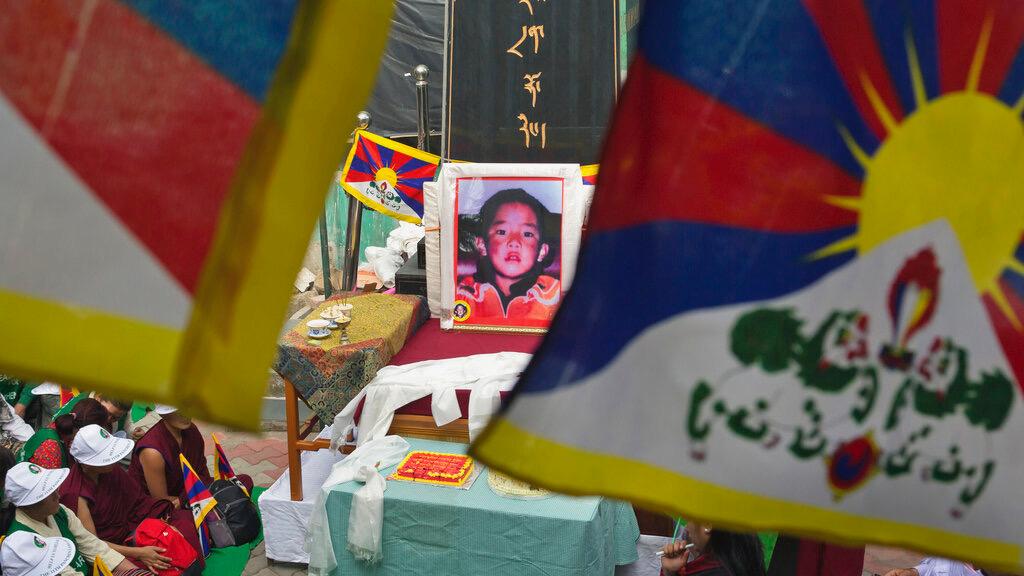The US draws a red line, saying China cannot name Tibetan Buddhism’s next leader
After 70 years of Chinese occupation of Tibet, the Tibetan government-in-exile says the situation in the country is only getting worse, with more than half a million rural Tibetans in military-style training camps in the last six months, similar to the ones holding Uighurs in Xinjiang.
“China has essentially locked down, closed off, a really significant portion of the world. Tibet is not a small mountain kingdom. It’s a vast area. Tibetans inside desperately are hoping for some stronger global support and intervention.”
“China has essentially locked down, closed off, a really significant portion of the world. Tibet is not a small mountain kingdom. It’s a vast area,” said Canadian Tibetan Lhadon Tethong, who directs the Tibet Action Institute. “Tibetans inside desperately are hoping for some stronger global support and intervention.”
Related: Reincarnating as an enlightened being isn’t easy. Especially when you’re 6 years old.
To some extent, their hopes have finally been answered. It’s taken years of rare bipartisan cooperation, but the US has now quietly taken a step that draws a red line for China in Tibet. The policy change was buried in the $900 billion economic stimulus package, part of a $1.4 million spending bill President Donald Trump signed in December. It says that if Chinese Communist Party officials try to interfere with the reincarnation process of the Dalai Lama, the US will impose economic and visa sanctions.
“This, for Tibetans, is a huge win because it sets a precedent globally that it’s one thing to tell the Chinese government, as many governments do, that this shouldn’t be done and that they shouldn’t do this,” Tethong said. “But to actually put some consequences, real consequences just changes the game.”
Related: Biden says he’ll make China quit coal. Can he deliver?
At 85 years old, the current Dalai Lama remains Tibetan Buddhism’s supreme spiritual authority. The title of the reincarnated leader who will succeed him is the Panchen Lama.
The monk who was first identified as the current Dalai Lama’s Panchen Lama successor died suddenly in 1989. A handful of years later, the Dalai Lama identified the young boy with the Panchen Lama’s reincarnated spirit, who would be his new successor. But within days, that boy disappeared and has reportedly been held in Chinese state custody ever since. Meanwhile, Communist Party officials chose another boy as the Panchen Lama, naming him the Dalai Lama’s successor.
If that man becomes the Dalai Lama, China will seek to control millions of followers across the world through him, said Bhuchung Tsering, vice president of the International Campaign for Tibet.
Related: Undeterred by ICC decision, Uighurs hail EU, UK steps toward holding China accountable
“The US government is merely saying that the Chinese government should respect Tibetan Buddhist tradition.”
“The US government is merely saying that the Chinese government should respect Tibetan Buddhist tradition,” said Tsering, who helped shape the new US policy that would punish Chinese officials if they try to install their successor when the Dalai Lama dies.
“The Chinese government now has got the message that they will not have an easy path of asserting their authority if they plan to do that.”
The new policy also instructs the State Department to deny China any new consulates in the US until a US Consulate is established in the Tibetan capital, Lhasa.
Related: China sentences lawyer who reported on outbreak to 4 years
“It has a political message of telling the Tibetan people the United States is very much to act as a watchdog on the Chinese government’s policies,” Tsering said.
China has responded angrily, saying the US is interfering with its internal issues. For his part, the Dalai Lama has told the BBC that he’d rather see his position end than be controlled by China.
“So much better, a centuries-old tradition cease[s] at the time of a quite popular Dalai Lama,” he said, laughing.
